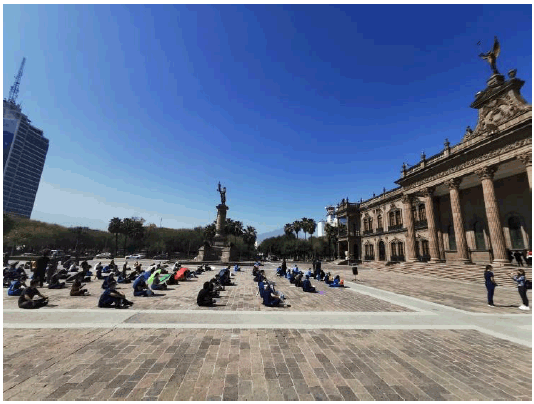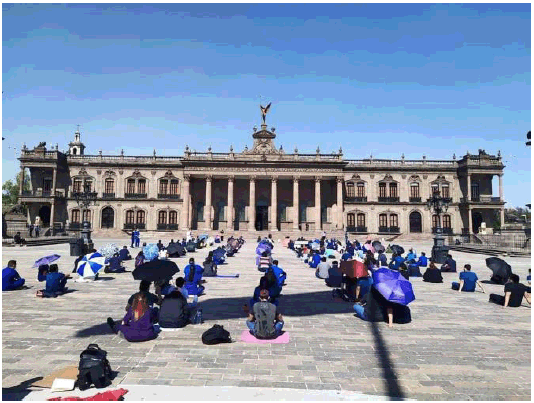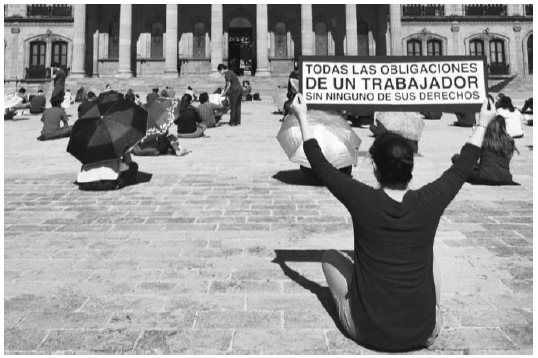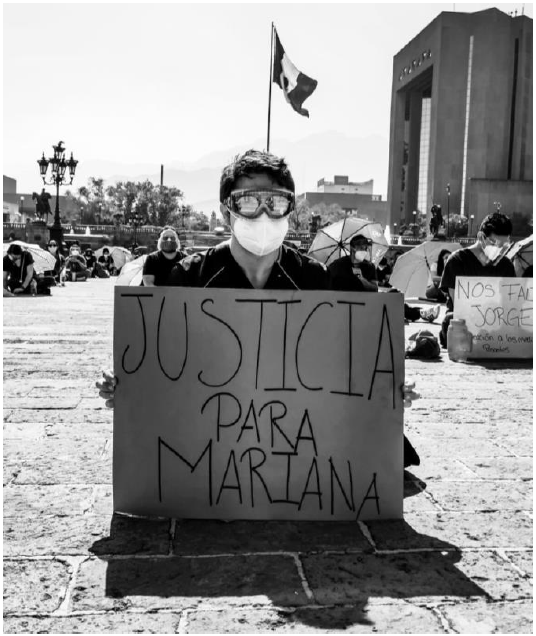Medical Students in Front of the Monterrey City Hall (side view).

Gabriela Torres-Hernández1, Patricio García-Espinosa1, Edgar Botello-Hernández1, Diego Ortega-Moreno1
doi: http://dx.doi.org/10.5195/ijms.2021.948
Volume 9, Number 1: 63-65
Received 09 02 2021: Rev-request 09 04 2021: Rev-recd 12 04 2021: Accepted 12 04 2021
On Saturday, February 6th, a protest of about 200 medical students, medical interns, social service physicians (SSF) and graduated physicians was carried out on the outskirts of the city hall of Monterrey Nuevo León - 2nd biggest metropolitan area of Mexico - on the Explanada de los Héroes (Esplanade of the Heroes). The protest was organized by senior medical students and coauthors of this manuscript: Patricio García-Espinosa and Gabriela Torres-Hernández, together with other senior students. It was organized through social media networks (Facebook, Instagram, and Twitter) where, a week before the protest, through these channels, instructions were given to maintain a distance of 1.5 meters across the length and width. On the day of the protest, marks were placed along the esplanade. The use of surgical uniform was requested, in order to make identification easier, while the use of facemask and face shield was mandatory. The use of posters was also requested, while the use of umbrellas and rugs was only suggested due to the terrain and varying weather conditions. The time from the protest ranged from 12.00 p.m. to 03.00 p.m. (Figure 1 and Figure 2), because at that time the Secretary of Health provides daily update conferences on COVID-19 for the general population.
Figure 1Medical Students in Front of the Monterrey City Hall (side view).

Medical Students in Front of the Monterrey City Hall (rear view).

The protest was covered by local media and featured participation of 4 organizers in the news conference, where the request was presented to the general population (Figure 3). For those who were unable to attend, support was asked from their homes, by using the custom profile photo frame on Facebook with the hashtag (#) of the protest; the # used was #SinSeguridadNoHayServicio which can be translated as “without security there is no service”. The protest occurred with everyone seated, except for the minute of silence dedicated to the SSF and medical interns who have lost their lives by doing their job.
Figure 3Event Organizers at the COVID-19 Press Conference.

In the last days of January 2021, the SSF Mariana Sánchez of 24 years old was killed while doing her job in a remote community of Chiapas, a state in southern Mexico known for being one of the poorest states in the country.1 The assassination of Mariana was announced after she reported that she suffered from sexual assault during her service, instead of providing the necessary support, they only told her to take 30 days off and come back to work after that.2 This occurred few days after the death of Jorge López, 23-year old medical intern, due COVID-19 was announced.3 The deaths of these young physicians has showed the exploitation of medical health care workers in Mexico, generating protest throughout the country, from medical students and physicians in general.4,5,6,7
The process of obtaining a medical degree normally lasts for 7 years, divided into 5 years of basic studies, 1 year of rotating undergraduate internships, and 1 year of social services which are normally carried out in hospitals and clinics of the health secretary. The interns have a payment of less than 2000 pesos (approximately 100 U.S. dollars on February 8th, 2021 and less than the minimum Mexican salary) while doing shifts of up to 60 hours a week. SSF, on the other hand, have a payment of less than 4000 pesos (approximately 200 U.S. dollars on February 8th, 2021) with shifts of up to 40 hours a week.8,9 The failures of the Mexican social service have been well documented previously by Nigenda, G.8 He exposed that there is a need for social service reform, and that the SSF need to be recognized as workers, and not as students. Insecurity and precarious working conditions have also been documented by reporters of the most important Mexican newspapers.10 However, social service still to this day remain the same.
In the Mexican Official Standard (NOM-009-SSA3-2013) it is established that the organizations responsible for the SSF are the schools and universities, on which the centers where they are being sent to, depend (rural and urban locations and hospitals). Excluding them as formally recognized workers under contract as established by the Mexican federal labor law.10,11
The solutions seem clear, and lies in the very foundation of medical social service in Mexico, which was originally organized as part of a scheme to provide outpatient services to rural and poor populations.12
We recommend the following:
Mid-term solutions:
We found this problem due to the idea imposed by the federal and state governments, where physicians must put vocation before integrity and that this allows them to do everything a worker does, but without the benefits of being a worker (Figure 4 and Figure 5).8,12
Figure 4Protest Request

Protest Request

There have been many ways to raise the voice of fellow doctors during these events, asking for justice and better conditions for social service physicians. We decided to make a sit-in because it was the easiest way to have controlled protests due to the COVID-19 pandemic. We believe that in events like these, any way is valid for the voices to be heard about a system that should have reformed years ago, and that show the conditions of labor exploitation in Mexico. We are proud to see the union of Mexican students throughout the country and to belong to the so-called Generación del Cambio (Generation of change).
A signed petition sheet was delivered to the authorities, in addition to conducting an online survey with suggestions to improve social service, and on the day of the protest, a box filled with these suggestions was also delivered. For now, the Nuevo Leon's Secretary of Health, Manuel de la O has promised that he will seek to comply with our requests.13
To all the members of GECEN and GENEP group, to the students of UANL Medicine School for the efforts made for the change; and César O. Ledesma-Orta and Vivian Morales-Venegas who take the pictures.
The Authors have no funding, financial relationships or conflicts of interest to disclose.
Conceptualization, Data Curation, Formal Analysis, Funding Acquisition, Project Administration, Resources, Supervision, Writing – Original Draft Preparation: & Writing – Review & Editing: GTH, PGE, EBH, DOM.
1. Martínez-Rodríguez JC, García-Chong NR, Trujillo-Olivera LE, Noriero-Escalante L. Inseguridad alimentaria y vulnerabilidad social en chiapas: el rostro de la pobreza [Food insecurity and social vulnerability in chiapas : the face of poverty]. Nutr Hosp. 2014 Dec 1;31(1):475–81. Spanish.
2. Domínguez P. Muerte de Doctora en Chiapas refleja que falta un camino largo contra violencia de género: Segob [Death of doctor in Chiapas reflects that there is still a long way to go against gender violence: Segob]. Milenio. Available from: https://www.milenio.com/politica/muerte-doctora-chiapas-camino-violencia-genero Last updated February 1, 2021; cited Feb 9, 2021
3. Heraldo de México. Muere médico interno por Covid-19; denuncian negligencia [Medical intern dies from Covid-19; negligence reported]. Available from: https://heraldodemexico.com.mx/nacional/2021/1/7/muere-medico-interno-por-covid-19-denuncian-negligencia-242718.html. Last updated January 7, 2021; cited Feb 9, 2021.
4. Martín F and Guiérrez O. CNDH y colegios de medicos exigen justicia para Mariana [CNDH and medical associations demand justice for Mariana]. El Universal. Available from: https://www.eluniversal.com.mx/estados/cndh-y-colegios-de-medicos-exigen-justicia-para-mariana. Last updated January 31, 2021; cited Feb 9, 2021.
5. Echeverría M. Exigen justicia por Mariana; se manifiesta personal de salud en CO [Demand justice for Mariana; health personnel protest in CO]. Availble from: https://www.elimparcial.com/sonora/ciudadobregon/Exigen-justicia-por-Mariana-se-manifiesta-personal-de-salud-en-CO-20210204-0018.html. Last updated February 4, 2021; cited Feb 9, 2021
6. Gutiérrez O. Estudiantes de Medicina en Chiapas marchan en protesta por el asesinato de Mariana [Medical students in Chiapas march in protest of Mariana's murder]. El Imparcial. Availble from: https://www.eluniversal.com.mx/estados/chiapas-estudiantes-de-medicina-en-chiapas-marchan-en-protesta-por-el-asesinato-de-mariana Last updated February 5, 2021; cited Feb 9, 2021
7. Cuen, A. “Ni una más”; pasantes alzan la voz en Obregón y exigen justicia para Mariana [“Not one more”; interns raise their voices in Obregon and demand justice for Mariana]. Expreso. Available from: https://www.expreso.com.mx/seccion/sonora/284855-ni-una-mas-pasantes-alzan-la-voz-en-obregon-y-exigen-justicia-para-mariana.html Last updated February 4, 2021; cited Feb 9, 2021
8. Nigenda G. Servicio social en medicina en México: una reforma urgente y posible [Social service in medicine in Mexico: an urgent and possible reform]. Salud Publica Mex. 2013 Sep–Oct;55(5):519–27.
9. Secretaria de Gobernación. NORMA Oficial Mexicana NOM-009-SSA3-2013, Educación en Salud. Criterios para la utilización de los establecimientos para la atención médica como campos clínicos para la prestación del servicio social de medicina y estomatología [Mexican Official Standard NOM-009-SSA3-2013, Health Education. Criteria for the use of health care facilities as clinical fields for the provision of social service in medicine and stomatology]. DOF. Available from: https://www.dof.gob.mx/nota_detalle.php?codigo=5354092&fecha=28/07/2014. Last updated July 28, 2014; cited Apr 12, 2021.
10. Estrada, A. Inseguridad. Médicos pasantes: Acorralados [Social service physiciands: Rounded up]. El Universal. Available from: https://www.eluniversal.com.mx/nacion/seguridad/pasantes-de-medicina-acorralados-por-la-inseguridad. Last updated March 12, 2018; cited Feb 9, 2021.
11. Cámara de Diputados del H. Congreso de la Unión. Ley Federal del Trabajo [Federal Labor Law]. DOF. Available from: http://www.stps.gob.mx/bp/secciones/junta_federal/secciones/consultas/ley_federal.html last updated June 13, 2014; cited Apr 12, 2021.
12. Graue Wiechers E. Perspectivas en el futuro cercano [Perspectives for the near future]. Gac Med Mex. 2012 May–Jun;148(3):294–301
13. Villegas G. Exigen pasantes de medicina mejores condiciones [Social service phyisicians demand better conditions]. El Norte. Availble from: https://www.elnorte.com/aplicacioneslibre/preacceso/articulo/default.aspx?__rval=1&urlredirect=https://www.elnorte.com/exigen-pasantes-de-medicina-mejores-condiciones/ar2120237?referer=--7d616165662f3a3a6262623b727a7a7279703b767a783a-- Last updated February 1, 2021; cited Feb 9, 2021
Gabriela Torres-Hernández, 1 Medical Student, School of Medicine, Universidad Autónoma de Nuevo León, Monterrey, México
Patricio García-Espinosa, 1 Medical Student, School of Medicine, Universidad Autónoma de Nuevo León, Monterrey, México
Edgar Botello-Hernández, 1 Medical Student, School of Medicine, Universidad Autónoma de Nuevo León, Monterrey, México
Diego Ortega-Moreno, 1 Medical Student, School of Medicine, Universidad Autónoma de Nuevo León, Monterrey, México
About the Author: García-Espinosa, Patricio. He is currently a sixth-year medical student of UANL medical school, Monterrey, Mexico of a six-year program. He is also current leader of GECEN researchers (Group of students against neurological diseases, undergraduate neurology department arm). Torres-Hernández, Gabriela. She is currently a sixth-year medical student of UANL medical school, Monterrey, Mexico of a six-year program. She is also current leader of GENEP group (Group of students focused on pediatric neurological diseases, undergraduate neurology department arm). Botello-Hernández, Edgar. He is currently a fifth-year medical student of UANL medical school, Monterrey, Mexico of a six-year program. He is also member of GECEN researchers. Ortega Rivera, Diego. He is currently a third-year medical student of UANL medical school, Monterrey, Mexico of a six-year program. He is also member of GECEN researchers.
Correspondence: Patricio Garcia-Espinosa, Address: School of Medicine, Universidad Autónoma de Nuevo León, Monterrey, México. Email: patricio.garciaes@uanl.edu.mx
Editor: J. Bonilla-Escobar Student Editors: Nguyen Tran Minh Duc Student Editors: Duha Shellah Copyeditor: Adnan Mujanovic Proofreader: Benjamin Liu Layout Editor: Anna-Maria Chantaliyska
Copyright © 2021 Gabriela Torres-Hernández, Patricio García-Espinosa, Edgar Botello-Hernández, Diego Ortega-Moreno
This work is licensed under a Creative Commons Attribution 4.0 International License.
International Journal of Medical Students, VOLUME 9, NUMBER 1, April 2021